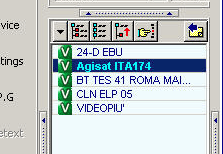
4) Hunting?
To define feeds
search term ''hunting" is used. This choice reveals more appropriate since
there are a lot of analogies that tie 2 so different and distant arguments.
Initially
could seem to you a vague discourse but when you will have experience you agree with us.
a) It's easy learn to shoot with a rifle; less easy succeed to make 9 centers on 10 hits.
Equally it's easy learn the various functions of 'scanning', not as many to succeed in
discovering a feed at the first hit.
b) you can be a good shooters, but you will never take anything if
choose wrong zone.
Equally, know well softwares won't help if you mistake choice of the satellite. A prepared
recipe doesn't exist, neither precise indications on "where" look for. This means that you must acquire a certain experience before succeeding in individualizing the favorable (the correct frequencies) zones.
But where are the feeds?
Choice
of broadcasterses!: the transponderses are rented, they are not free and they cost (a lot). DSF has for instance used for his feeds 5°W, 22°W,36°E,28°E,10°E,16°E and even once 13°E (Yes! on HotBird there
are some feeds but isolated, on Astra 19.2°E not even that).
Keep in mind besides that many west satellites have double spot, above all those on the Atlantic. They serve for transfers from and for America as the Atlantic Bird 1 to 12.5°W, the Telstar 12 to 15°W, the NSS7 to 22°W, the Intelsat 801 to 18°W and the PAS 6B and 3R on the 43°W (PAS is for PANAM SAT).
c) a good shooters,
in correct place won't take nothing in lethargy time.
Besides "where" problem
there is also "when" problem. You will learn that there are some moments of day propitiate for some types of feed or, for instance, that is useless look for feed of a game 3 hours before beginning (for which motive a cameraman should turn on the camera 3 hours before the game?).
On some Forum
there are often some Feed in "Sticky". They are cases in which it foresees that is used determined feed because of the regularity of the event, as for instance in the case of a tournament of tennis or Olympics
games.
There are some feeds, we say "fixed", they are those of press agencies which the newscasts are subscribed for receiving images in real time from every part of globe. Examples are APTN: Associated Press Television News to 10 east codified in RAS and APTN Direct for coverage events live in clear always to 10°E, the Reuters famous
press agency encoded in Videoguard to 22°W.
d) a hunter must know how to recognize
plunder.
The feeds are often mixed with normal channels. In some case you will expressly find word < feed > but
many times you will individualizing them. There are some elements that characterize the feeds
like:
>> After channels search
 | - Name channel atypical (es. CHEV3, DKDR, etc...). EBU / UER from us known as Eurovision it's consortium of national Tv from various European countries therefore often the id are ITRAI for feeds RAI, PTRTP for Portuguese. As you can see the first 2 letters are for nation and following ones for the tv of state to which refers. Id CHEV is for European Confederation Elvetique Vision since the center some Eurovision is usually in Switzerland this is used for feed of over ocean, and from USA. |
-
Name containing one of usual feed agencies (es. ENEX, BGBNT, SNG: Service News Gathering, DSNG: Direct Service NEws
Gathering, etc...)
-
Name containing an event or a particular place (APTN-BAGHDAD, CANNES1)
>> After having found and
showed channel
- absence of logo or any other symbol
- A commentator's lack above all during sporting events
-
Audio come directly from the camera (the audio that you hear in TV comes always recorded by special microphone
of interlocutor to isolate noises). In fact what sense have journalists with big microphone
on mouth if there is that of camera?
- Video of high quality (the image must be
high defined since later can be compressed according to demands).
- Initially,
if you are not practical, can be useful compare charts Feed published on some
website. Generally is symbol rate that helps on some satellites (low and "typical", as for instance 6666, 6111, 5632, etc...).
3/9
<< PREVIOUS
5/9
NEXT >>
FEED INTRODUCTION
1)
What are "feeds"?
2) Feed Archive
3)
Requirement
4) Hunting?
SEARCHING METHODS
5) Direct insertion
6) Charts
based search
7) Blind search
8)
Feed in 4:2:2 format and encrypted
9)
Conclusions